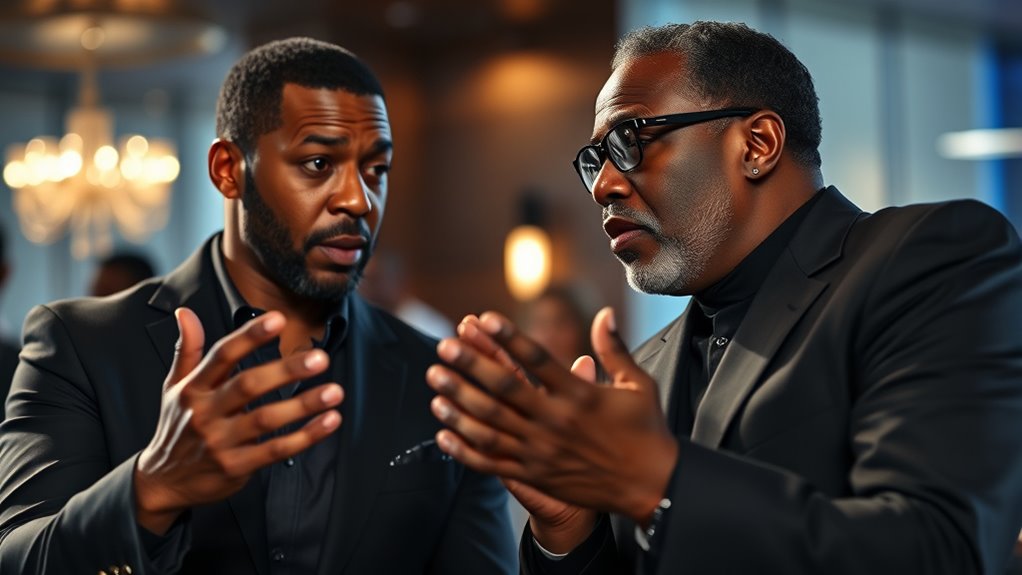Denzel Washington and Spike Lee highlight major shifts in the film industry, focusing on the need for authentic stories and greater diversity. Washington urges filmmakers to stay true to their vision and address societal issues, while Lee emphasizes increasing minority voices and inclusive decision-making. Both see technology and streaming platforms as opportunities to democratize content, but warn that commercial pressures shouldn’t compromise authenticity. Want to understand how these changes could shape the future of cinema? Keep exploring to find out more.
Key Takeaways
- Denzel Washington emphasizes the importance of authentic storytelling that reflects real-life struggles amid industry changes.
- Spike Lee advocates for increased diversity and systemic reform to ensure minority voices are represented in film.
- Both recognize technology and streaming platforms as tools to democratize content but caution against commercial compromises.
- They stress the need to prioritize meaningful, society-reflective narratives over profit-driven productions.
- Washington and Lee encourage fostering an inclusive cinematic landscape that maintains artistic integrity and cultural honesty.

The film industry is undergoing rapid transformation, and veterans like Denzel Washington and Spike Lee have strong opinions about its direction. As someone who follows Hollywood closely, you might sense that these changes aren’t just superficial but touch the core of storytelling and representation. Denzel Washington, with his extensive career, often emphasizes the importance of storytelling that reflects real-life struggles and diverse voices. He believes the industry is finally moving toward more authentic narratives that resonate with a broader audience, but he also urges caution. Washington worries that commercial pressures might dilute meaningful content, turning films into mere products rather than tools for cultural reflection. He encourages aspiring filmmakers to stay true to their vision and to focus on stories that matter, even if they’re not the most commercially viable.
Spike Lee, on the other hand, is vocal about the need for systemic change. He’s been a fierce advocate for racial equality and believes the industry still has a long way to go. You might notice that Lee criticizes the dominance of blockbuster franchises and the lack of opportunities for minority voices behind the camera. He advocates for more diversity in decision-making roles, emphasizing that authentic representation starts with who gets to tell the stories. Lee’s perspective is that the industry is at a crossroads—either it embraces inclusivity or continues to marginalize important voices. He encourages filmmakers and studios to take responsibility and make conscious choices that promote equity. For Lee, these shifts aren’t just about box office numbers but about societal progress and cultural integrity.
Both Washington and Lee recognize the potential of technology and streaming platforms to democratize content and reach wider audiences. However, they’re also wary of how commercial interests might compromise artistic integrity. As someone interested in the future of film, you can see that their insights highlight the tension between innovation and tradition. While the industry evolves rapidly, these veterans remind you that storytelling’s core—truth, representation, and authenticity—must remain central to the art of filmmaking. Their voices serve as a call to action for creators to shape a more inclusive, honest, and meaningful cinematic landscape.
Additionally, embracing diverse voices can foster richer, more engaging stories that truly reflect society’s complexity.
Frequently Asked Questions
How Have Denzel Washington and Spike Lee’s Careers Evolved Over the Years?
Your careers have evolved markedly over the years. Denzel Washington has shifted from powerful, charismatic roles in films like *Malcolm X* to more diverse characters, showcasing his range and depth. Spike Lee has consistently pushed boundaries with provocative storytelling, expanding his influence in filmmaking and activism. Both have remained relevant by adapting to industry changes, inspiring new generations, and continuously delivering impactful work that reflects societal shifts.
What Specific Industry Changes Do They Believe Are Most Impactful?
You see, industry changes are like shifting sands, and they believe diversity and representation are the most impactful. They’ve seen Hollywood transform from a closed castle to an open landscape, yet argue there’s still work to do. They emphasize that embracing new voices, technology, and storytelling formats is essential. Their careers mirror this shift—adapting and evolving, they remind you that progress requires continuous effort and openness.
How Do They View the Future of Black Representation in Hollywood?
You’ll see more black representation in Hollywood’s future, they believe, as opportunities grow and stories become more diverse. They think the industry is shifting toward authentic voices and inclusive casting, which will lead to richer storytelling. You should expect increased visibility for black actors, directors, and writers, opening doors for more impactful roles and narratives that reflect real experiences. This progress will continue as awareness and commitment to diversity expand across the industry.
What Advice Do They Offer to Emerging Black Filmmakers?
Imagine yourself standing at a crossroads, path illuminated by your unique voice. Denzel Washington and Spike Lee advise you to stay true to your story, embrace your authenticity, and persevere through obstacles. Keep honing your craft like a sculptor chiseling marble, shaping your vision with passion. Trust your perspective, collaborate with others, and remember that your voice can change the landscape of Hollywood for generations to come.
How Have Their Personal Experiences Shaped Their Industry Perspectives?
Your personal experiences shape your industry perspectives by highlighting the challenges and opportunities you encounter. They teach you resilience, the importance of authentic storytelling, and the need for representation. When you face setbacks or successes, you learn valuable lessons that influence your approach and goals. Embracing your background helps you stay true to your vision, advocate for change, and inspire others, ultimately impacting the industry’s evolution and diversity.
Conclusion
You can see how industry shifts are shaping your favorite filmmakers’ perspectives. Denzel Washington and Spike Lee highlight the importance of adaptability and diversity in today’s evolving landscape. Notably, a recent study shows that films featuring diverse casts increased by 25% last year, emphasizing the industry’s push toward inclusion. As you follow these changes, remember that embracing new trends can open doors and create fresh opportunities for storytellers like yourself.









